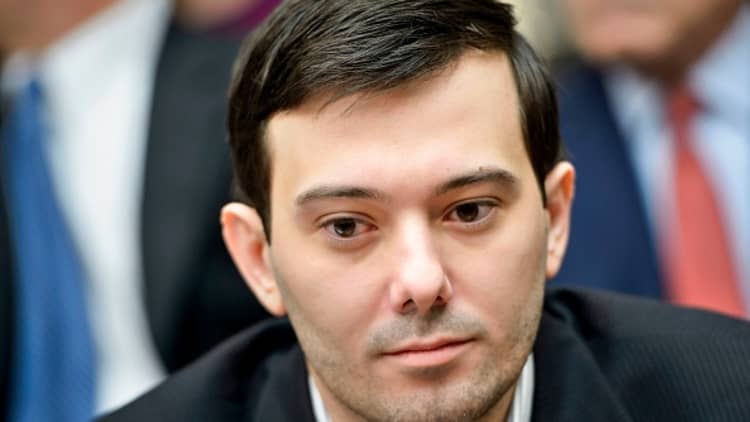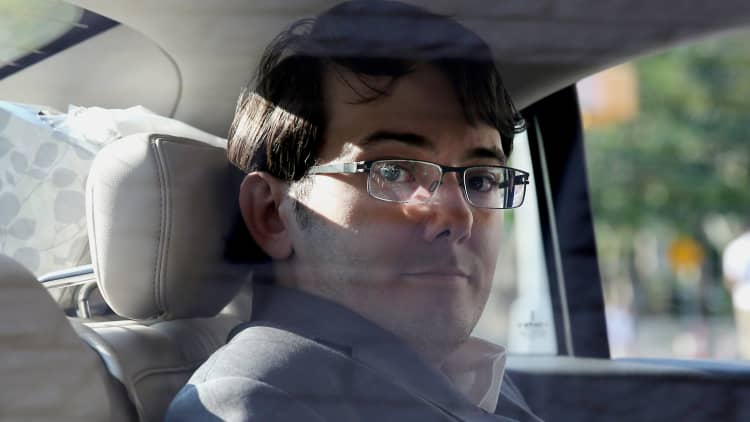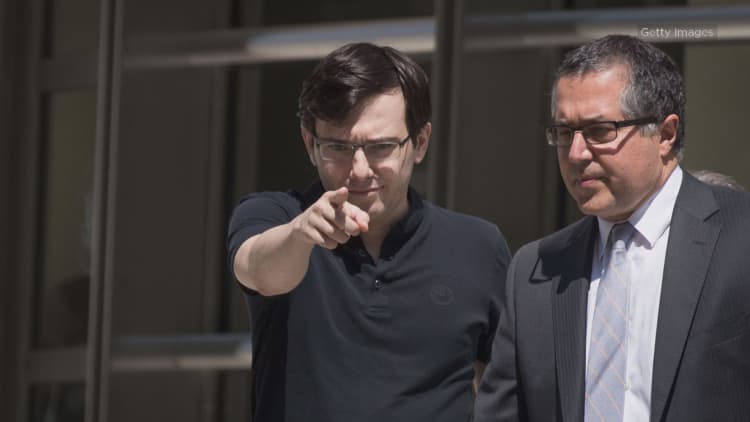
Martin Shkreli gained a number of monikers in his rise to infamy. Pharma Bro. Most hated man in America. Face of corporate greed.
Executives in the drug industry call him something else: catalyst.
"He was, in the great scheme of things, a drop in the bucket," said Ron Cohen, CEO of biotech company Acorda Therapeutics and past chair of the Biotechnology Innovation Organization industry group. "But he created such a massive impression and blowback that it forced entire industries, government, patient advocacy groups, the media and political entities all to focus on these issues in a way that I don't know that they would have absent that event."
The nearly three-year saga that saw Shkreli come to prominence as a pharmaceutical CEO, raise the price of a 60-year-old medicine by 5,000 percent, purchase a single-copy Wu-Tang Clan album for $2 million, get arrested on unrelated charges of securities fraud, troll America, get convicted, and be sent to prison in a bizarre set of circumstances involving Hillary Clinton's hair follicles ostensibly came to an end Friday, when he was sentenced by a federal judge to seven years in prison.

But his actions — at least those involving pharmaceutical pricing — had an impact that persists, those in the drug industry say, from spurring a conversation about the complexities of drug pricing, to priming the pump for drug pricing scandals that followed, to illuminating inefficiencies in the generic drug market.
"There's no question that pricing has been on the mind of people for several years; Shkreli put a fine point on it," said Jeff Jonas, CEO of Sage Therapeutics. "Access to medicines remains an important social issue for our time."
But Shkreli's unique ability to capture and cling to the public's attention vaulted the focus on drug prices to another level, said Peter Bach, director of the Center for Health Policy and Outcomes at Memorial Sloan Kettering.
"Shkreli was a perfect item for the media," Bach said. "If this had been a couple of quiet accountants with a hedge fund that had done this, and when they got called, their answer was 'No comment,' or the usual, 'Our pricing reflects — take your pick — the value of our products to patients, the cost of innovation, unmet need, cost savings, whatever — I think it wouldn't be a story."
This basically appeared to be a moneymaking scheme that took advantage of the inefficiencies in the approval of generics. The only positive was that he drew attention to the complexity.Jeff JonasCEO of Sage Therapeutics
But Shkreli doubled down, infamously saying at the Forbes Healthcare Summit just before his arrest in December 2015 that if he could change anything he'd done, he'd have raised the price of the drug in question — called Daraprim — even further.
"My shareholders expect me to make the most profit," Shkreli said onstage at the time. "That's the ugly, dirty truth."
Moving the market
So how can Shkreli's impact be measured? One clear metric is the stock market. News of his 5,000 percent price increase on Daraprim — from $13.50 a pill to $750 — in September 2015 prompted then-presidential candidate Hillary Clinton to tweet about a forthcoming plan to stop such "price gouging."
Biotech stocks swiftly sank 5 percent — a move so closely tied to Shkreli's action that some questioned whether he'd somehow masterminded the whole event to profit from shorting the sector. The group didn't begin its recovery until the following autumn.
But Shkreli had created an environment that shined a spotlight on others playing a similar game.
"The Shkreli incident primed the pump," Cohen said. "You had all these different branches of society, not least the media, looking for examples, looking for places where they could unearth similar behavior or analogous instances."
One was at drug company Valeant, which in the summer of 2015 was trading at more than $250 a share before questions arose about its business practices. The questions included its strategy of acquiring old medicines and dramatically raising their prices, as featured in a prominent story in the New York Times.
"That was a big deal," Bach recalled.
Valeant's former management team was hauled in front of Congress in April 2016, along with shareholder Bill Ackman of Pershing Square, to answer questions about the pricing practices. Further questions about its business model sent the stock into a tailspin, and it bottomed out below $10 a share last year.
Meanwhile, another pricing scandal was brewing, this one of a different nature: Mylan's slow but steady increase in the price of the EpiPen, the epinephrine auto-injector used in the event of an allergy attack, by a cumulative 400 percent over a decade.
It was during 2016's back-to-school season — a time when parents often stock up on the devices, which expired every year, to send with their kids to school — that Mylan grabbed headlines. CEO Heather Bresch responded by starting a new national conversation about drug prices: pointing a finger at the middlemen who she said contributed to rising prices.
"No one's more frustrated than me," Bresch told CNBC at the time.
Spotlight turns to drug supply chain
Bresch drew pharmacy benefit managers and the rest of the drug supply chain into the controversies over pricing, changing the discussion to one embraced by the rest of the pharmaceutical industry.
If we do get a transformation, which I think we're going to get, and the book is written about how all this happened, he gets a chapter for sure.Peter BachMemorial Sloan Kettering
"In the end, I think it led to a substantial heightening of awareness of how this whole system works," Cohen said.
Pharmacy benefits managers came under pressure — particularly Express Scripts as it was the only free-standing company in the group. This week health insurer Cigna announced it would buy the company for $67 billion.
The supply chain also became a focus of the Trump administration's efforts to target drug prices, one of a number of ways government entities have responded to the national outcry.
FDA Commissioner Scott Gottlieb cited "pernicious" rebating and contracting schemes in a speech this week about market access to cheaper copies of biotech drugs called biosimilars. And he's focused attention on the generic drug space, moving to streamline approvals and publishing a list of drugs vulnerable to Shkreli-like actions: those that have lost patent protection but have no generic competition.
"We don't play a role in drug pricing, but we do affect drug competition in terms of getting new drugs onto the market, and create competition to older drugs, particularly with generic drugs," Gottlieb told CNBC at the time.
Shkreli helped draw attention to those exploitable issues in the generic drug space, said Jonas.
"This basically appeared to be a moneymaking scheme that took advantage of the inefficiencies in the approval of generics," he said of Shkreli's move. "The only positive was that he drew attention to the complexity of the" system.
Drug list price increases slow
So have drug price increases stopped, or slowed? Yes and no.
"Shkreli's actions did call attention to list prices — a drug's price before rebates and other discounts," said Adam Fein, CEO of Drug Channels Institute. Before 2014, Fein said, list prices had been growing by 10 to 15 percent annually.
"Since then, list price growth has slowed," he said, noting a number of pledges from drug company CEOs to limit increases to less than 10 percent a year. "I expect average brand-name list price growth to be 7 to 10 percent over the next few years."
Growth after rebates and discounts has been climbing "in the low single digits" for the past few years, Fein said.
But large increases still happen. Last month alone, Wells Fargo analyst David Maris tracked the 50 biggest price increases on medicines, the largest of which was a 948.4 percent increase on a drug from Torrent Pharmaceuticals.
And data from Rx Savings Solutions show price increases of less than 10 percent on expensive medicines can result in adding thousands of dollars to their cost.
Source: Wells Fargo/MediSpan PriceRx
Increases of 9 percent on the average wholesale price of Celgene's cancer medicines Pomalyst and Revlimid, for example, added more than $4,000, the data show.
"Shkreli played a pretty simple game: Raise the price and juice the profit," said Michael Rea, CEO of Rx Savings Solutions. "But there are price changes that happen that yield far greater profit than anything that Shkreli did."
Biotech bristles at Shkreli's insinuation he's one of the group.
"He was in a different business," said Stelios Papadopoulos, chairman of biotech giant Biogen. "People need to appreciate what he's being sentenced for has nothing to do with his activities with regards to drug pricing — and even his drug pricing has nothing to do with what people do in the drug business, who invest hundreds of millions of dollars to discover drugs."
"I see him as essentially a hedge fund manager," Cohen added.
The seven years Shkreli was sentenced to for his conviction on three counts including securities fraud, having to do with hedge funds he ran and a former biotech company, Retrophin, that he founded before Turing, was significantly higher than the 18-month request made by defense attorneys. But it was shorter than the 15 years requested by government prosecutors.
He will get credit for the six months he has already spent in jail. After his release, Shkreli will be on probation for three years.
He also will need to pay a $75,000 fine, and will be barred from holding a majority stake in a company or serving as an executive or director.

"Shkreli has no lasting impact on biotech," said Evonne Sepsis, an industry investment banker at ESC Advisors. "Biotech's focus has been and continues to be on cutting-edge research and development and innovation to deliver therapies to patients."
Still, said Bach, the conversation around pricing has changed since Shkreli burst on the scene.
"If we do get a transformation, which I think we're going to get," Bach said — referring to a move toward tying drug prices to outcomes measures, "and the book is written about how all this happened, he gets a chapter for sure."

